Ukrainian refugees to mark first Christmas in UK
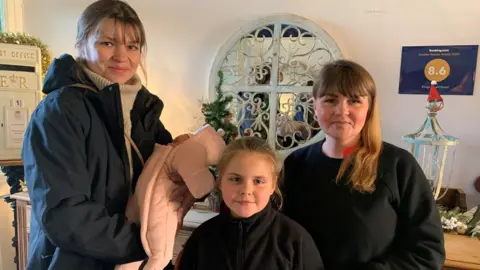 BBC
BBCFor the Ukrainians who came to live in the UK after the start of the Russian invasion this Christmas will be very different from the celebrations they are used to.
There will still be gift-giving, traditional food and songs, but most will spend the festive season thousands of miles from their loved ones.
The BBC has spoken to two women now living in North Yorkshire about what they went through to get here and how they will mark Christmas.
Larysa, 42, lived in Kharkiv, just 25 miles (40km) from the Russian border. She said in the early days of the invasion, the bombing began and she made the decision to leave her home.
She travelled to Poland with her nine-year-old daughter Zlata and their two dogs, before a chance meeting with an English teacher in Wroclaw led her to a new home in the north of England.
The teacher appealed to his friends in the UK to ask if anyone could sponsor them, and within weeks they were moving in with a family in Ilkley, West Yorkshire.
'Everything was exploding'
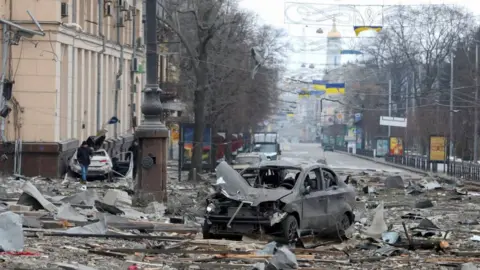 Reuters
ReutersLarysa and Zlata then moved from Ilkley to Kirkbymoorside in North Yorkshire where she now works in a hotel and her daughter has settled into primary school.
They speak to their family back home every few days, and hope to do so on Christmas Day - but the connection is intermittent and sometimes calls do not go through.
"There is electricity but not always internet, as there is not always enough power for everyone's mobile phones and devices," Larysa said.
"At the moment, they have to make choices about what to use the energy on."
Describing what it was like to live in Kharkiv, she said: "We were staying in the basement, all of us in there for three weeks.
"Everything was exploding, and when you went out of the basement you just saw fires, fires, bombing and explosions.
"You couldn't even sleep at night because there was a problem in our city where the alarm [air raid siren] was broken. It was hard."
Larysa's childhood friend, Oksana, was living nearby with her family - heavily pregnant with her daughter Katya, who is now just a few weeks old, and her two sons, aged nine and 11.
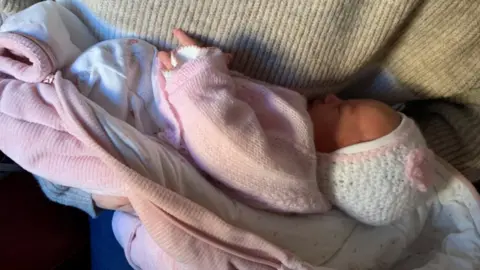
Law student Oksana wanted to move to safety before her baby was born and, with Larysa's help, found a sponsor in Nawton Beadlam - a few miles from Kirkbymoorside - and began a gruelling eight-day journey to Yorkshire from Kharkiv, via Poland, Germany and Scotland.
As she is learning to speak English, Larysa translated for her. She said: "They started bombing and there were fires all around, there was a petrol station not far from them, they lost their house, and they went to Oksana's husband's parents' house. Everything burnt down.
"That's why they came here, she wasn't sure what the situation was going to be and to live in a basement when you are pregnant and to have to have a baby in the basement, it is not the best idea.
"The boys as well, they heard the bombing all the time, when they arrived they were very nervous and very worried. Even today, when we hear planes in the sky, we feel scared. We don't accept any planes as normal ones at all. When we hear a plane, you don't trust it."
Borscht, cabbage rolls and fried fish
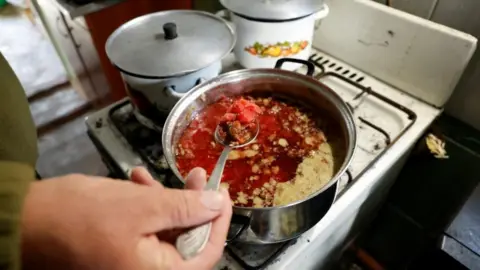 Reuters
ReutersIn Ukraine, Christmas is typically celebrated on 7 January, but this year people are being urged to celebrate on 25 December in a symbolic move to align with the West.
Christmas traditions include exchanging presents and eating a 12-course meal on Christmas Eve, typically including dishes such as borscht, cabbage rolls and fried fish.
Larysa, Oksana and their children will spend Christmas with their host families, sharing a traditional turkey Christmas dinner with some Ukrainian dishes too.
Describing a typical Christmas before war broke out, Larysa said: "On Christmas Eve, children go to visit their godparents and receive gifts, and we eat a special meal.
This usually starts with kutia, a wheat berry pudding made with raisins, honey and lots of tasty things, depending on the region of Ukraine you are from.
"Years ago, children would go from house to house and sing carols, but nowadays not so much."
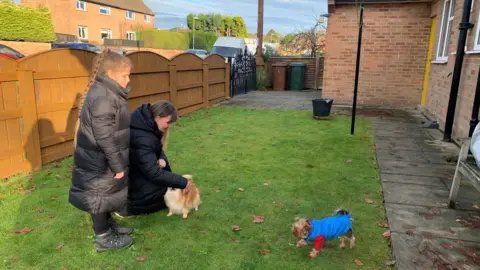
She said back home, no-one sends Christmas cards but she has embraced the tradition here, writing cards to people she has met here and her family in Kharkiv.
Ukrainian New Year is marked on 14 January, and Larysa showed me a photograph of her family in Freedom Square in Kharkiv, which was bombed by the Russians in March this year, killing 10 people and injuring at least 35 more.
"We were waiting there for friends in the snow," she said. "It is the second largest square in Europe, but now it has been destroyed."
When asked if they will move back to Ukraine, Larysa said she didn't know what the future would bring or how they would be able to return to their homes.
She said she was "so grateful" to be in the UK, and was taking life one day at a time.

Follow BBC Yorkshire on Facebook, Twitter and Instagram. Send your story ideas to yorkslincs.news@bbc.co.uk.
